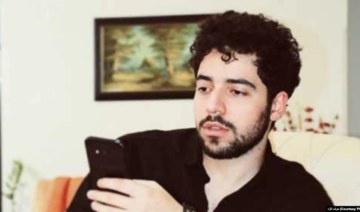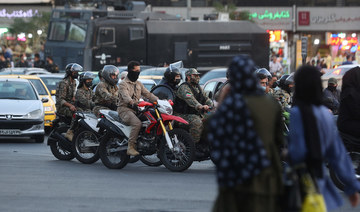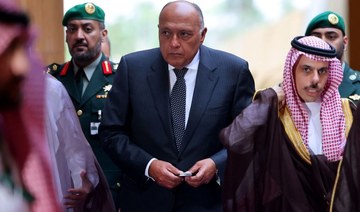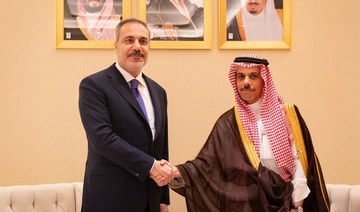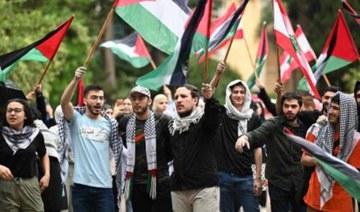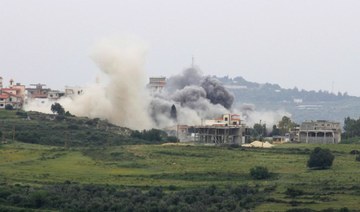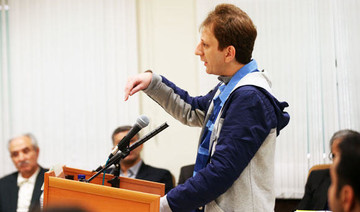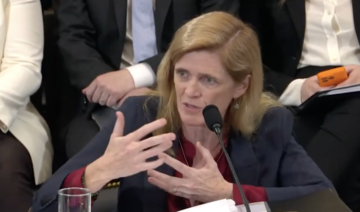TEHRAN: Iranian singer Shervin Hajjipour, arrested after his song in support of protests over the death of Mahsa Amini went viral, has been released on bail, an official said Tuesday.
A wave of unrest has rocked Iran since the 22-year-old Iranian Kurdish woman died on September 16 after her arrest by the morality police in Tehran for allegedly failing to observe the Islamic republic’s strict dress code for women.
The street violence has led to the deaths of dozens of people — mostly protesters but also members of the security forces — and hundreds of arrests.
“Shervin Hajji Aghapour has been released on bail so that his case can go through the legal process,” Mohammad Karimi, prosecutor of the northern province of Mazandaran told Iran’s state news agency IRNA.
Rights groups outside of Iran reported his arrest last week.
Hajjipour, a 25-year-old pop singer and songwriter, rose to fame for the song “Baraye,” “For,” in which he put together messages posted on Twitter about the reasons for protests.
The emotional performance became a viral hit on different social media platforms, with millions of views within days.
It is no longer available on his Instagram account, which currently has more than 1.7 million followers.
The song featured in many videos of protests on social media, and also made its way to local media.
The ultra-conservative Tasnim news agency published its own version of the video clip, keeping Hajjipour’s voice, while changing the accompanying images into ones showing the Islamic republic’s achievements.
The agency said that its video, posted Sunday on Telegram, is meant to show “more realistic concepts of what is happening in the media battlefield,” by using “more meaningful pictures.”
Tasnim on Tuesday said Hajjipour was arrested “for showing support for the rioters and solidarity with the enemies by posting the song in social media without getting permission for it.”
Iranian singer arrested during Amini protests released
https://arab.news/m95te
Iranian singer arrested during Amini protests released
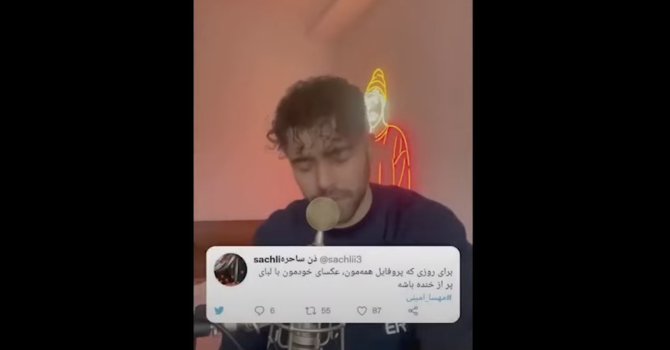
- Hajjipour rose to fame for the song “Baraye,” “For,” in which he put together messages posted on Twitter about the reasons for protests
Blinken says he will press Netanyahu on Gaza aid measures during Israel trip
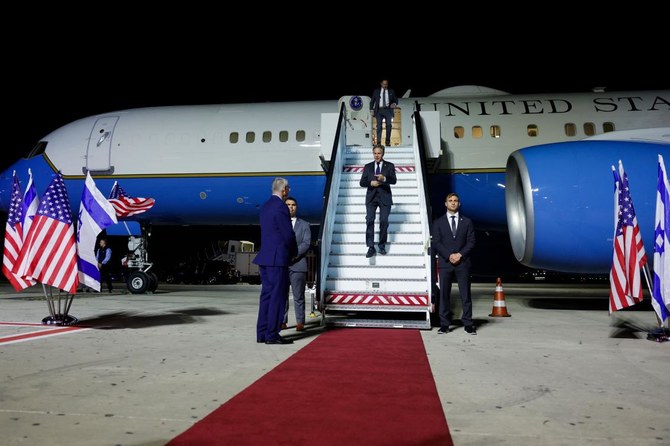
Blinken spoke to reporters at a warehouse of the Jordan Hashemite Charity Organization where aid shipments from US-based charities are gathered. While there are some improvements in the humanitarian aid situation in the densely populated enclave, he said, much more needs to be done to ensure assistance reaches people in a sustained manner.
“I’m now able to go to Israel tomorrow and go over with the Israeli government the things that still need to be done if the test is going to be met of making sure that people have what they need,” Blinken said.
“And I’ll be doing that tomorrow directly with Prime Minister Netanyahu and other members of the Israeli government,” he said.
Blinken’s check-in with Netanyahu on aid will take place about a month after US President Joe Biden issued a stark warning to Netanyahu, saying Washington’s policy could shift if Israel fails to take steps to address civilian harm, humanitarian suffering, and the safety of aid workers.
A spiraling humanitarian crisis has prompted calls from Israel’s Western and Arab partners to do more to facilitate the entry of aid to Gaza, where most people are homeless, many face famine, disease is widespread, and where much civilian infrastructure lies in ruins.
REGIONAL TOUR
The top US diplomat is on a tour of the Middle East, his seventh since the region plunged into conflict on Oct. 7 when Palestinian Hamas militants attacked Israel, killing 1,200 people and abducting 253 others, according to Israeli tallies.
In response, Israel has launched a relentless assault on Gaza, killing more than 34,000 Palestinians, local health authorities say, in a bombardment that has reduced the enclave to a wasteland. More than one million people face famine, the United Nations has said, after six months of war.
The first shipments of aid directly from Jordan to northern Gaza’s newly opened Erez crossing will leave on Tuesday, goods are also arriving via the port of Ashdod, and a new maritime corridor will be ready in about a week, Blinken said.
“But more still needs to be done,” he said. “We still have to have a deconfliction mechanism that’s effective and works — that’s a work in progress,” Blinken added.
He said there should also be a clear list of items needed in Gaza to avoid “arbitrary denials” — a reference to a process of rigorous inspections of aid shipments that has seen some trucks stranded at border crossings.
US and Egyptian presidents warn of danger of military escalation in Rafah
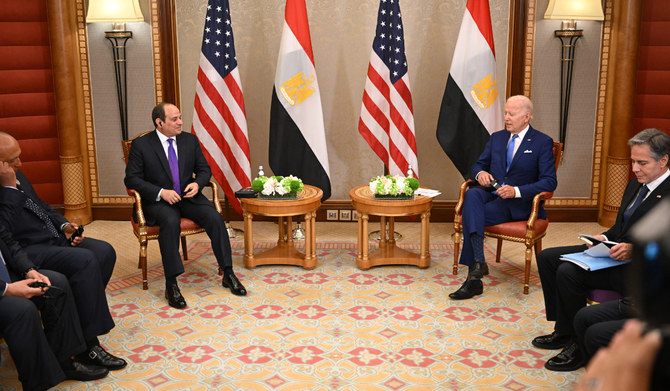
- The leaders say an Israeli assault on the Gazan city would exacerbate the humanitarian crisis and have repercussions on security and stability across the region
CAIRO: The Egyptian president, Abdel Fattah El-Sisi, and his US counterpart, Joe Biden, on Tuesday discussed the efforts being made by Egypt to encourage a ceasefire agreement in Gaza between Israel and Hamas and secure the release of hostages.
Ahmed Fahmy, a spokesperson for the presidency, said the two leaders expressed concern about the potential danger of a threatened Israeli military escalation in the city of Rafah in southern Gaza, which has become the final refuge for more than a million Palestinians displaced by fighting from other parts of the territory. They said it would add a further, catastrophic dimension to the already worsening humanitarian crisis in Gaza, and have wider repercussions on security and stability across the region.
The war began with the Oct. 7 attacks by Hamas on Israel, in which 1,170 people were killed, according to a tally by news agency Agence France-Presse. The militants also took about 250 hostages; Israeli authorities estimate 129 of them are still being held in Gaza, including 34 believed to be dead.
During Biden’s telephone call to El-Sisi, the Egyptian president stressed the need for humanitarian aid workers to be granted full and unrestricted access to Gaza, and highlighted the intensive efforts Egypt has been making in support of the aid effort.
The presidents agreed on the importance of preventing any regional expansion of the conflict, and reaffirmed that a two-state solution to the long-running dispute between Israel and Palestine is the best way to achieve peace, security and stability in the Middle East.
They also highlighted the strategic partnership between Egypt and the US, and their continuing efforts to strengthen bilateral cooperation at all levels.
UNICEF demands immediate ceasefire in southern Lebanon, protection of children
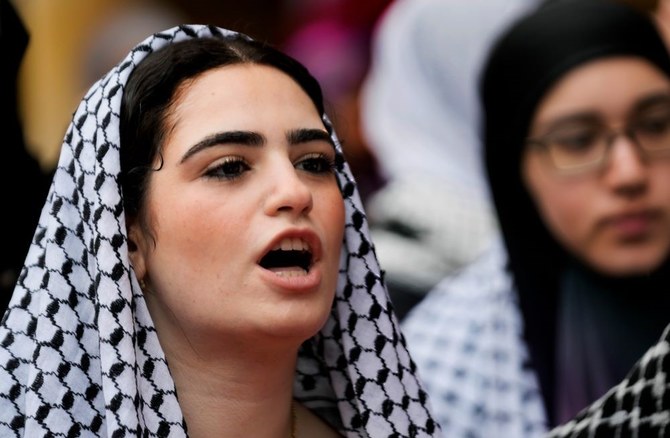
- Israeli airstrikes destroy houses, wounding individuals
- Students from the American University of Beirut and the Lebanese American University called on their administrations “to boycott companies and institutions supporting Israel”
BEIRUT: Lebanon’s Disaster Risk Management Unit announced that the total death toll from Israeli attacks since Oct. 8 has reached 438 people.
According to the latest report issued by the Lebanese Ministry of Health, eight children were among the dead and 75 children were among the 1,359 people injured since the escalation of hostilities.
The UN Children’s Fund expressed its concern over “the continuing hostilities in southern Lebanon that are taking a devastating toll on the population, forcing around 90,000 people, including 30,000 children, from their homes.”
UNICEF called for “an immediate ceasefire and the protection of children and civilians,” and indicated that “the increase in armed conflict has damaged infrastructure and civilian facilities, causing severe damage to basic services that children and families depend on, including nine water stations serving 100,000 people at least.
“More than 70 schools are currently closed, affecting around 20,000 students and significantly affecting their education. Around 23 healthcare facilities — serving 4,000 people — are closed due to the hostilities.”
UNICEF’s representative to Lebanon, Edouard Beigbeder, expressed the organization’s deep concern. “As the conflict impacting the south of Lebanon is in its seventh month, we are deeply alarmed by the situation of children and families who have been forced from their homes and the profound long-term impact the violence is taking on children’s safety, health, and access to education.
“As long as the situation remains unstable to this extent, more children will suffer,” Bigbeder warned. “Protection of children is an obligation under the International Humanitarian Law and every child deserves to be safe.”
In a statement, UNICEF indicated that before the outbreak of the conflict, basic services in Lebanon, including health and education systems, were in danger of collapsing after years of overwork. The unprecedented economic and financial crises that have hit the country since 2019 have exacerbated existing economic vulnerabilities.
Following the displacement of residents from the southern border region, UNICEF, in collaboration with its partners, has been providing “crucial aid to affected families seeking refuge in shelters. Emergency cash assistance, facilitated in partnership with the Ministry of Social Affairs, has been extended to meet the immediate needs of 85,000 individuals. Some displaced children have managed to resume their education in official schools, receiving essential supplies and transportation support.”
On Tuesday, hostilities persisted intermittently on the southern front between Hezbollah and the Israeli military.
An Israeli airstrike targeted a house along the Kafr Kila — Al-Adisa road, destroying it and causing severe damage to nearby properties and homes. Additional Israeli airstrikes struck homes and commercial establishments in the towns of Aita Al-Shaab, Yaroun, Jebbayn, the outskirts of Naqoura, Alma Al-Shaab, and Jabal Al-Labouneh.
In solidarity with Gaza and echoing student activism in US universities, Lebanese university students organized sit-ins on campus or nearby areas, brandishing Lebanese and Palestinian flags and demanding the liberation of Palestine and a cessation of attacks on southern Lebanon.
Students from the American University of Beirut and the Lebanese American University in Beirut called on their administrations “to boycott companies and institutions supporting Israel.”
Similar demonstrations unfolded in several private universities across Lebanon, including Beirut Arab University, Lebanese International University, Saint Joseph University, Haigazian University, and Holy Spirit University of Kaslik.
Iran commutes a tycoon’s death sentence to 20 years in prison
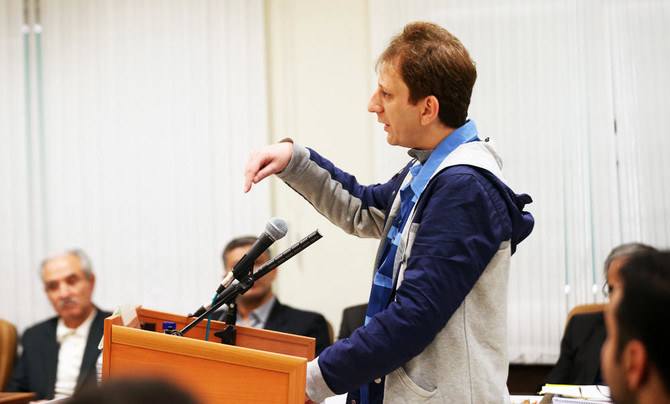
- Babak Zanjani was sentenced to death in 2016 over a number of charges
- An appeal for amnesty by Zanjani was reviewed and his death sentence was “commuted to a 20-year prison term
TEHRAN: Iran’s judiciary said Tuesday that it commuted a death sentence for a tycoon to 20 years in prison after he returned around $2.1 billion in assets from illegally selling oil abroad, the official IRNA news agency reported.
Babak Zanjani, 48, was sentenced to death in 2016 over a number of charges, including money laundering, forgery and fraud that disrupted the country’s economy.
IRNA quoted judiciary spokesman Asghar Jahangir as saying that an appeal for amnesty by Zanjani was reviewed and his death sentence was “commuted to a 20-year prison term after approval by the Supreme Leader.”
Ayatollah Ali Khamenei has the final say on all state matters and occasionally issues pardons.
Jahangir said as part of Zanjani’s 2016 sentence, he had the right to an amnesty or commutation of his death sentence if he returned the assets, compensated for damages and expressed regret for wrongdoing. The spokesman said that Zanjani cooperated with the judiciary to locate the assets abroad in recent years while he was in prison, and all the money was returned.
Zanjani was arrested in 2013 shortly after the election of then President Hassan Rouhani as part of a crackdown on alleged corruption during the rule of former President Mahmoud Ahmadinejad.
Authorities said then that Zanjani owed more than 2 billion euros ($2.1 billion) for oil sales he made on behalf of Ahmadinejad’s government. Zanjani was one of Iran’s wealthiest businessmen, with a fortune worth an estimated $14 billion.
The commutation of Zanjani’s sentence indicates that Iran’s government is in need of revenue after years of US sanctions on the country.
In 2018, then President Donald Trump pulled the US out of a nuclear deal with Iran that had aimed to lift sanctions on Iran in return for the capping of the country’s nuclear activities. Since then, Iran has found it difficult to sell its crude, the country’s main source of foreign revenue. After Trump’s unilateral withdrawal from the deal, Iran’s rial currency tumbled.
In 2014, Iran executed another billionaire businessman, Mahafarid Amir Khosravi, for a $2.6 billion state bank scam in Iran.
UN chief says ‘incremental progress’ toward averting Gaza famine
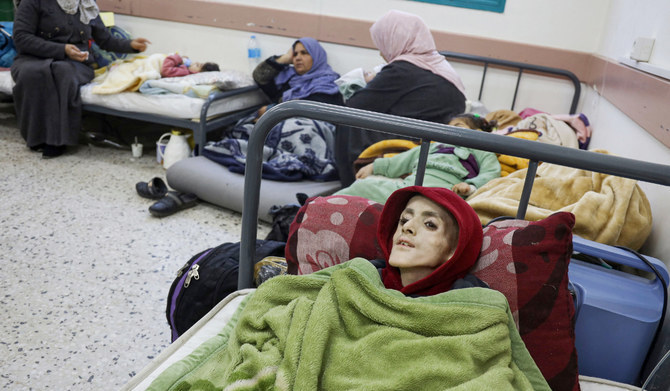
- Guterres said a major obstacle to distributing aid across Gaza is a lack of security for aid workers and civilians
UNITED NATIONS: United Nations Secretary-General Antonio Guterres on Tuesday said there has been “incremental progress” toward averting “an entirely preventable, human-made famine” in the northern Gaza Strip, but much more is urgently needed.
He specifically called on Israel to follow through on its promise to open “two crossing points between Israel and northern Gaza, so that aid can be brought into Gaza from Ashdod port and Jordan.”
Guterres also told reporters that a major obstacle to distributing aid across Gaza is a lack of security for aid workers and civilians.
“I again call on the Israeli authorities to allow and facilitate safe, rapid and unimpeded access for humanitarian aid and humanitarian workers, including UNRWA, throughout Gaza,” he said.



